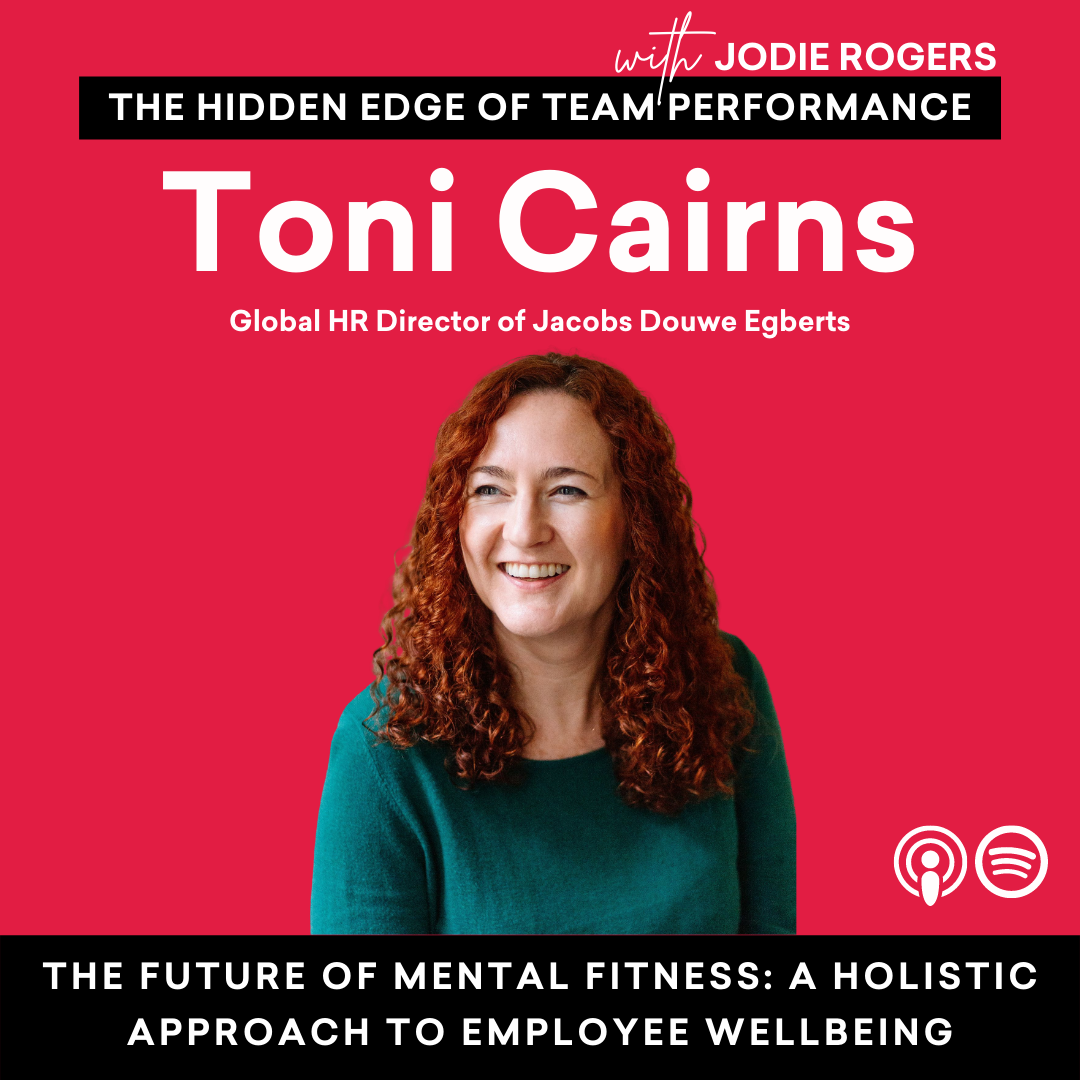Holistic Well-Being: Why the Future of Well-Being is About Whole People

We're living through fast-changing times, and the rate of change is accelerating. This brings challenges for our well-being that need to be addressed both individually and collectively, to create more resilient teams. But how is our view of well-being changing in the post-pandemic world? How can we expect corporate and societal attitudes towards it to also change?
Holistic well-being: The future will not be compartmentalised
Faced with unprecedented change, some leaders are embracing a holistic approach that encompasses both emotional and physical aspects of well-being. One advocate of this model is Jacobs Douwe Egberts (JDE) Global HR Director Toni Cairns.
Toni talked with Symbia MD Jodie Rogers on The Hidden Edge of Team Performance podcast episode 5 about the future of employee well-being and mental fitness. As Toni points out, mental fitness brings massive business value when leveraged, and damages companies when neglected. How have corporate attitudes and approaches to this crucial success factor developed and changed over time? Where are they headed in the future?
As well-being evolves from being seen as an employer branding tool to playing a central role in leadership development as well as forming a crucial pillar of compensation packages, Toni foresees a shift towards a holistic well-being model. A holistic approach regards well-being not as added value for employees, but as an essential – as basic hygiene. In the post-pandemic workforce, companies will need not only to compensate people fairly, but also to provide tools for enhancing their well-being across their personal and professional lives.
Nature abhors a vacuum
Well-being doesn’t exist in a silo. People don’t just go to work and walk off the rest of their lives from everything that happens outside the office. Rather, the various parts of our lives overlap, our mental and emotional well-being affects our physical health and vice versa, and our social support system influences our wellbeing as well.
One outcome of the COVID-19 pandemic has been to create change by causing people to reflect more deeply on wellness, well-being, physical and emotional health and self-care and acknowledge the impact these have on life as whole – not just on our ability to perform professionally, but on how we show up in life.
The pandemic has strengthened our awareness of the "big picture" of our lives and put our values and sense of purpose into context. In that respect, COVID-19 is an equalizer: it show us all of us what's most important – and also makes clear that emotions like happiness, gratitude, and joy connect across every aspect of life. They are the glue that's holding it all together.
From great resignation comes great benefit
The Great Resignation is not an American movement. It’s global. The employee dissatisfaction fueling it has not only given workers leverage to negotiate more favorable working conditions - it has also led to a rethinking of how people view work. Society is evolving toward a view of life in which work is only one (and not always the most important) part. That is driving companies to target not just the workplace, but life as a whole, to increase employee well-being.
Low wages and poor working conditions are one cause of the worker dissatisfaction. However, they are only small pieces of the bigger picture of overall well-being. People don't leave the workforce for just one of those reasons; they leave because the parts don't add up. Their work fails to provide them with meaning or a purpose, and they may feel that this negatively impacts their sense of mental and physical well-being.
When this is the case, cosmetic well-being initiatives that only scratch the surface of the deeper dissatisfaction problem are doomed to fail. Companies are waking up to this fact. They are investing in creating positive workplace cultures as well as training employees to increase their emotional intelligence and resilience to be healthier, happier, and make more intentional choices in their work and personal lives.
Work 2.0: Life and work as two sides of the same coin
The pandemic has dissolved the boundaries between our work life and our private life. That means well-being must have a place - and be able to flourish - in both.
Mental fitness is the key to enabling this. It's not a fixed quality, but one that fluctuates and can be strengthened across 6 key components: self-awareness (your ability to understand how you're thinking, feeling and behaving), self-management (your ability to use tools and techniques that ensure consistent high performance), agility (your adaptability to adapt to change), resilience (your ability to recover from setbacks), mindset (your belief in your ability to overcome challenges), and the fundamentals (essentials like diet, exercise and sleep that are hard to prioritise under pressure).
Knowing how you score on those key mental fitness components at any given time is the first step to enhancing your overall mental fitness and well-being.
Like mental fitness, without which it couldn't exist, employee well-being is not just one thing – it's an amalgam of components that weave together to form a healthy, happy, and productive human being. The post-pandemic view of wellness aims to strengthen all of these components. In the process, it leads to more resilient people, and to teams that function to their full potential.
Like Martin Luther King, Jr. once said, 'The arc of the moral universe is long, but it bends toward justice.' Positive change is slow, but steady, and as mentioned at the start of this article, the rate of change is accelerating. Meanwhile, the concept of employee well-being is evolving. It's becoming a holistic model that treats people not as company property during their work hours, but as individuals whose emotional, physical, personal, and professional lives are interconnected. In our view, that's progress.
Employees are (whole) people, too
The whole employee is greater than the sum of their parts, and the same is true of companies. Companies cannot stand on their own. They are collections of people. Is it any surprise that they are only as healthy as the people who comprise them?
Read about Toni's commitment to closing the gender leadership gap as a mentor for The Female Factor: https://www.femalefactor.global/product-page/toni-cairns
Want to learn more about how Symbia supports employee well-being and helps leaders and teams to harness their inner game for competitive advantage? Email us at team@symbiapartners.com.

